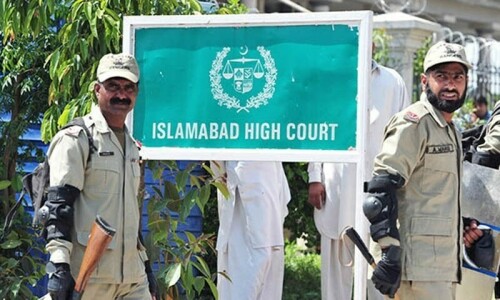THE problem is not just that the US military’s top official and the White House have made different claims about the Haqqani network issue. It’s that they continue to do so. On Sept 28, two days before he retired, Adm Mike Mullen told an interviewer he would change “not a word” of his statement implying a Pakistani link, through the Haqqani network, to the attack on the US embassy in Kabul. That same day, various segments of American officialdom began to backtrack on his remarks. A story appeared in the western press about Pentagon officials claiming that intelligence did not support Pakistan’s link to the embassy attack. The White House press secretary tried his best to evade reporters’ questions about it. The secretary of state on Thursday mentioned nothing more than safe havens, and President Obama has gone even further by stating that it is unclear whether Pakistan actively supports the Haqqanis or simply leaves them alone.
For the US military’s top commander to issue a statement implying that Pakistani intelligence had plotted to attack Americans in Afghanistan is a serious issue, and his administration’s subsequent back-pedalling implies either deliberate manipulation or the mismanagement of its very delicate relationship with Pakistan — either conclusion a worrying one. Was Adm Mullen used to get Pakistan to focus on the Haqqanis because he was days away from retirement? Is his continued defence of his language part of a plan supported by strategic leaks to the media? Or was he speaking on his own, and has the civilian administration stepped in for fear of upsetting a relationship neither the US nor Pakistan want to live with but know they can’t do without? Either way, the public wavering on the issue does not bode well for the management of US-Pakistan ties.
This is partly because the Pakistani side has not been particularly coordinated either. A relatively restrained response by the military was accompanied, perhaps on direction, by aggressive statements from politicians, including some unlikely claims denying all links to the Haqqanis. As for the All-Party Conference, a large number of politicians as well as the military may have agreed on the wording of the resolution, but proof of this will lie in its implementation. Does the renewed focus on dialogue mean the military will be willing to suspend ongoing operations against the Tehrik-i-Taliban Pakistan, for example? In Pakistan the problem is worse than one of communication: it is that civilians have little control of the country’s security policy, with consequences that are plain to see. Combined with America’s mixed messaging, it hardly inspires high hopes for the future of the relationship.








































Dear visitor, the comments section is undergoing an overhaul and will return soon.